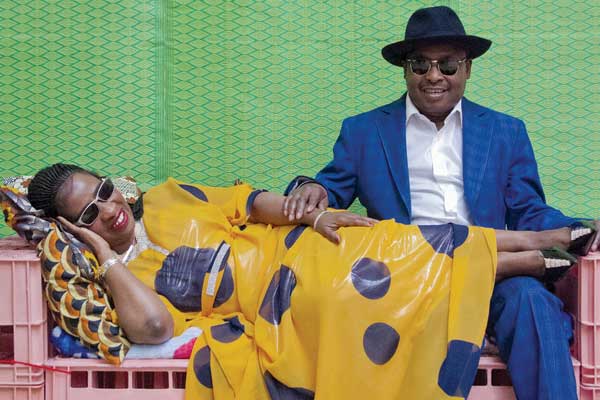This article was written prior to the emerging coronavirus crisis when Amadou & Mariam were scheduled to visit Australia to perform at Bluesfest as well as their own headline shows in Sydney and Melbourne.
Bluesfest are going to need a bigger stage as they welcome Afrobeat heroes Amadou & Mariam, who bring with them 40-odd years of joyful Malian and African music.
Hailing from Mali in West Africa, the husband-and-wife duo of guitarist/ vocalist Amadou Bagayoko and vocalist Mariam Doumbia are the most famous ambassadors of Malian music, melding traditional beats and rhythm with contemporary touches to create a singular Afro-pop sound.
Both Amadou and Mariam are blind and met at Mali's Institute For The Blind, marrying in 1980 and making a name for themselves as proponents of Malian blues by the middle of the decade. Their music takes on a blues-rock quality from Amadou's admiration of Jimi Hendrix and Led Zeppelin.
Before they bring Malian blues to Byron Bay, Amadou tells us about what to expect from their live shows, what their music is all about and much more.
What do you two want to achieve in 2020?
Well, I wish good health and to keep playing music throughout the year.
Your hopes and expectations for your upcoming Australian tour, in particular playing at Bluesfest?
We are very excited to be playing at Bluesfest. We’ve heard that the line-up is amazing. So, we are happy and thankful that the festival invited us.
It's a long flight to Australia; how do you like to fight the boredom on long plane flights?
Indeed, it’s a very long flight. Honestly, I like to sleep (laughs). I always sit next to Mariam, so sometimes we spend the time talking about our tour and songs that we are going to play.
Do you think Australian audiences respond well to your brand of music?
Oh yes, they do. We hope they will have fun with our new tracks from our latest album, 'La Confusion'. Our sound is quite unique with many references and influences that makes it easy to enjoy and dance. Well, that’s one of our goals when writing and composing songs.
What are some of the social and political messages you like to communicate with your music?
We talk about things that we experience, things that we live and listen. In 'La Confusion', we talk about the social and political situation in Mali, but once composing we realised that this 'confusion' is not only in Mali, but around the world. We have a message, but we also want people to dance with our music.
Amadou – what is your favourite type of guitar to play?
Actually, my very first instrument was a djembe but very soon I changed and started playing the guitar. Recently, I’ve been playing with a James Trussart Steelcaster. We did a tour last year in the US and I was invited to visit their workshop, and they’ve done a wonderful, customised guitar with three pickups; they were very warm and adjusted – all things I needed for my perfect guitar.
You've been a musical duo and a couple for some 40 years – what's your secret for keeping it all together?
Well, we go together really well and we know each other. Whenever we have anything that does not work or that we don’t agree, we talk and try to find a solution. Our relationship is based on understanding and trying the best for both of us.
As Amadou & Mariam you have influenced many bands and artists; who were some artists that influenced your music?
Many artists have influenced our music, from Pink Floyd, Bad Company, Eric Clapton, Jimmy Hendrix; Mariam loves Sheila, Sylvie Vartan y Dalida; and many music genres such as salsa, rock, pop.
Also, through the years, we were lucky enough to have worked, performed, collaborated with so many artists that shared with us their music, experiences that without doubt influences our way to perform and create our own sound.
In what ways has Afrobeat grown and evolved as a style over the past 40 years?
Yes, it is a sound reference for African music. From its legendary father Fela Kuti to today the list of artists that have explored this style in their music is varied. It's a vibrant music, culturally rooted and with such a varied audience. And nowadays, more often, we see mainstream artists working with African artists and this brings Afrobeat to a whole, new audience.
Who are some modern Afrobeat bands and artists you think will take the genre into the future?
We are in a globalised era where collaborations are a key part of creating and sharing your music and style. Also the fact that many DJs have used Afrobeat tracks for their mixes has helped to bring this style to a whole, new level.
Do you have a message for Australian fans?
First of all, we would like to send a special message of support to all Australians for the recent bushfire crisis, and we hope all communities and nature are safe now. And regarding our tour, we hope that a lot of fans join us to enjoy some Afrobeat party at Bluesfest!
Amadou & Mariam were scheduled to play the cancelled Bluesfest as well as their own headline shows in Sydney and Melbourne prior to the COVID-19 pandemic. Amadou & Mariam's most recent album was 2017's 'La Confusion'.

